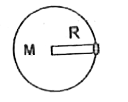The mass and diameter of a planet have twice the value of the corresponding parameters of earth. Acceleration due to gravity on the surface of the planet is
9.8ms−2
4.9ms−2
980ms−2
19.6ms−2
The correct Answer is:B
To find the acceleration due to gravity on the surface of a planet with mass and diameter twice that of Earth, we can follow these steps:
1. Identify the parameters:
- Let the mass of Earth be me.
- The mass of the planet mp=2me (twice the mass of Earth).
- Let the radius of Earth be re.
- The diameter of the planet is twice that of Earth, so the radius of the planet rp=2re.
2. Use the formula for acceleration due to gravity:
The acceleration due to gravity g at the surface of a planet is given by the formula:
g=G⋅mr2
where G is the universal gravitational constant, m is the mass of the planet, and r is its radius.
3. Set up the ratio of gravitational accelerations:
The acceleration due to gravity on the planet gp can be expressed as:
gp=G⋅mpr2p
For Earth, it is:
ge=G⋅mer2e
4. Calculate the ratio of gp to ge:
gpge=G⋅mp/r2pG⋅me/r2e=mpme⋅r2er2p
5. Substitute the values:
Substitute mp=2me and rp=2re:
gpge=2meme⋅r2e(2re)2=2⋅r2e4r2e=2⋅14=12
6. Find gp:
Since ge (acceleration due to gravity on Earth) is approximately 9.8m/s2:
gp=12ge=12⋅9.8m/s2=4.9m/s2
Final Answer:
The acceleration due to gravity on the surface of the planet is 4.9m/s2.
---
- Let the mass of Earth be me.
- The mass of the planet mp=2me (twice the mass of Earth).
- Let the radius of Earth be re.
- The diameter of the planet is twice that of Earth, so the radius of the planet rp=2re.
The acceleration due to gravity g at the surface of a planet is given by the formula:
g=G⋅mr2
where G is the universal gravitational constant, m is the mass of the planet, and r is its radius.
The acceleration due to gravity on the planet gp can be expressed as:
gp=G⋅mpr2p
For Earth, it is:
ge=G⋅mer2e
gpge=G⋅mp/r2pG⋅me/r2e=mpme⋅r2er2p
Substitute mp=2me and rp=2re:
gpge=2meme⋅r2e(2re)2=2⋅r2e4r2e=2⋅14=12
Since ge (acceleration due to gravity on Earth) is approximately 9.8m/s2:
gp=12ge=12⋅9.8m/s2=4.9m/s2
The acceleration due to gravity on the surface of the planet is 4.9m/s2.
Similar Questions
Knowledge Check
If the radius of earth were to decrease by 1%, its mass remaining the same, the acceleration due to gravity on the surface of the earth will
Aincrease by 1%Bdecrease by 2%Cdecrease by 1%Dincrease by 2%
The mass of a planet is twice the mass of earth and diameter of the planet is thrie the diameter of the earth, then the acceleration due to gravity on the planet's surface is
View SolutionThe density of the core of a planet is x and that of outer shell is y. The radii of the core and that of the planet are R and 2R. The acceleration due to gravity at the surface of planet is same as at a depth R. The ratio of x and y is n/3. Find the value of n.
View SolutionAssuming the mass of Earth to be ten times the mass of Mars, its radius to be twice the radius of Mars and the acceleration due to gravity on the surface of Earth is 10m/s2 . Then the accelration due to gravity on the surface of Mars is given by
View SolutionIn a hypothetical uniform and spherical planet of mass M and radius R, a tunel is dug radiay from its surface to its centre as shown. The minimum energy required to carry a unit mass from its centre to the surface is kmgR. Find value of k. Acceleration due to gravity at the surface of the planet is g.

View SolutionHow is the acceleration due to gravity on the surface of the earth related to its mass and radius ?
View SolutionThe density of a newly discovered planet is twice that of earth. The acceleration due to gravity at the surface of the planet is equal to that at the surface of the earth. If the radius of the earth is R, the radius of the planet would be
View SolutionThe diameters of two planets are in the ratio 4:1 and their mean densities in the ratio 1:2 The acceleration due to gravity on the particles wil be in ratio.
View Solution
